|
FAQs about Tang Trauma
FAQs on:
Tang Disease 1,
Tang Disease 2,
Tang Disease 3,
Tang Disease 4, Tang Disease 5, Tang Disease 6, Tang Disease 7,
Tang Disease
8,
Tang Health 9,
Tang Disease 10,
Tang Disease 11,
Tang Disease 12,
Tang Disease 13, &
FAQs on Tang Disease by Category:
Diagnosis,
Environmental,
Nutritional,
Social,
Pathogenic (plus see below),
Genetic,
Treatments
FAQs by Tang Disease by Pathogen: Tangs/Rabbitfishes & Crypt, Tangs/Rabbits Crypt 2, Tangs/Rabbits Crypt 3, Tangs/Rabbits Crypt 4, & Paravortex/Black Spot Disease,
Related Articles:
The Surgeonfish family, Acanthurus, Ctenochaetus, Naso,
Paracanthurus,
Zebrasoma , Prionurus, Surgeonfishes of Hawai'i, Surgeonfishes for Reef Systems,
Infectious Disease,
Related FAQs:
Tangs in General, Tang ID, Selection, Tang Behavior, Compatibility, Systems, Feeding, Treating Marine Disease, Marine Diseases 2,
|
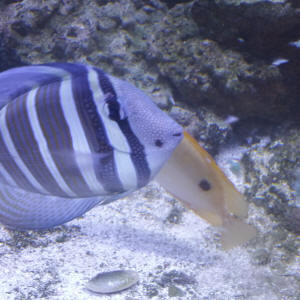
|
Surgeonfishes: Tangs for Marine Aquariums
Diversity, Selection & Care
New eBook on Amazon: Available here
New Print Book on Create Space: Available
here
by Robert (Bob) Fenner |
 |
|
Tomini tang mouth injury
5/15/19
Good morning,
<Morning Cindy>
This Tomini tang has been in my 75-gal reef for about a year and a half with no
issues. I noticed yesterday that he was hiding in the rocks and didn’t come out
for Nori as usual. During last evening’s feeding he chased food and tried to eat
but his mouth seems stuck open and maybe a little swollen – it’s hard to say.
<Could be a physical trauma or something stuck in its mouth>
Today he is swimming in the open in a sort of bobbling fashion. His fins are
clamped (I think), he is clearly in some sort of distress. Not picking the rocks
or glass at all. Tankmates are several different species of wrasse, a recently
added Eibli angelfish (I have not seen the two interact much, they have avoided
each other though the Eibli has been aggressive toward other tankmates), a
couple clownfish. Some smaller, innocuous fish, a BTA and a mini carpet ‘nem.
There are no other signs of disease – no spots, gills not red, etc. All other
tankmates behaving as usual.
<How about your water quality, maintenance practices...sometimes (more than we
thought) it could be environmental>
I’m concerned, clearly he’s in distress and the other fish (notably 2 of the
wrasses and the angel) keep swimming by him.
<Are you sure these fish are not bothering the tang at all?>
I am hesitant to remove and stress him further unnecessarily but don’t want
anyone to get hurt.
<I recommend you reduce stress by dimming the lights for a couple of days and
see if condition is reverted, also try feeding with Spectrum 1mm pellets,
perhaps it will be easier for the tang to swallow than the Nori until it resumes
normal feeding.>
Also, if there is treatment I would initiate it but not sure what, if any.
<I wouldn’t treat, there are no clear signs of a disease.>
Please share your thoughts.
Gratefully, Cindy
<Hope this helps, Cindy. Wil.>
|
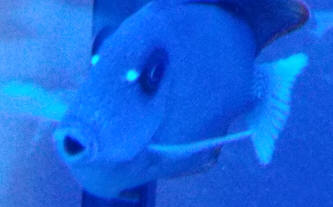 |
|
White ring on Clown Tangs head 1/20/19
Hi Crew,
<Hey Lloyd!>
I was admiring my fish and noticed this ring on my clown tang that is on his
head near his left eye. I would like to know what this is. And if it is a minor
or serious condition? He is still aggressive with the other fish, eating and
swimming, no visible signs of stress. But I worry that it could get out of
control quickly. To me it looks like he may have rubbed a rock or gotten into a
small fight that has caused this.
<You´re right, it is a physical trauma, I wouldn't worry as it will heal in a
few days/weeks, just pay attention to its behaviour to see if it is scratching
against the rocks; I hope your tank is big enough (150+g).Surgeonfishes need
plenty of space to swim freely.>
Regards,
Lloyd
<Cheers. Wil>
|
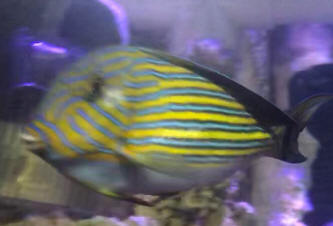 |
|
Mimic tang injuries (?) and a (possibly) nibbled Galaxea
12/29/17
Bob, et. al.
You are all amazing and I really appreciate all the excellent assistance you
give! I came home to notice what look like injuries on my mimic tang. I didn't
notice anything yesterday and I did rearrange the rockwork in the holding tank
to allow more open space for swimming/observing, so I'm wondering/hoping he
somehow got injured rather than suddenly expressing an illness.
<Possibly>
The damage is only on one side. He is 3.5" and has been housed for 3 weeks in a
70 gal holding/QT tank with a 3.5" PBT, a 4.5" Z. desjardinii, 2" flame
angelfish, neon cleaner goby, 1" Rainford's goby, and a .75" Pajama
cardinal.
<All these tangs are getting along here?>
I also noticed damage to the Galaxea coral polyp I'm using to gauge the
reliability of the angelfish...does the central polyp look "munched" to you or
maybe some other cause?
<Again; it's possible, but not likely from fish grazing. Oculinids, galaxy
corals are VERY stinging>
I just moved the coral prior to the picture so it isn't particularly happy and I
haven't ever had a coral nipper (knock on wood) so I'm not certain...
<I would not be concerned here re the fish livestock nibbling Galaxea. The Mimic
Tang will heal in time, given good nutrition and a lack of aggression. Bob
Fenner>
|
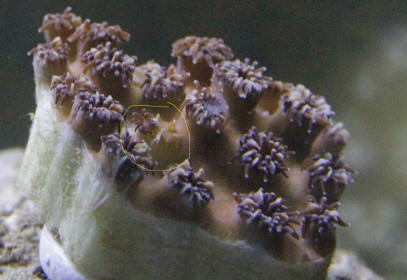
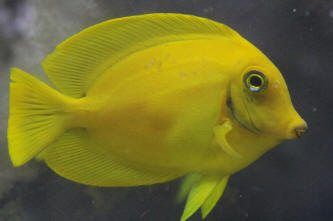
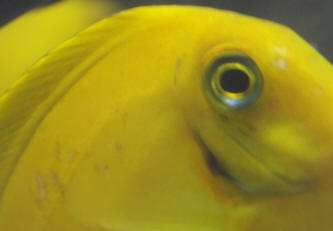 |
|
re: Mimic tang injuries (?) and a (possibly) nibbled Galaxea
12/30/17
Bob, Thanks for the quick response. The tangs haven't shown *much*
aggressive behavior, though the Desjardinii hides a lot when we're around.
<Good and not atypical>
I have lots of grazing opportunities in the tank and they're well fed. I did
notice some flashing/aggression from the PBT the day previous, which is one
more reason I suspect injury.
<Me too>
They've been in QT for three weeks without any signs of illness... Should I
move them to the 220 gal DT even though they haven't finished out QT?
<If it were me, mine... I'd move the two, but leave the PBT for another week
or two in QT>
Move the mimic to a 29 gal treatment tank to observe wounds/sores?
<I'd just place it in the main/display. Will heal on its own much faster in
a stable environment>
Put the rock work back to the way it was before the sores?
<I'd leave as is>
Any other suggestions?
<Keep beer in a cool, dark place>
Thanks a million!
Branon
<As many welcomes. BobF>
|
|
Mimic Tang issue 11/21/17
Hello,
<Hey Ron>
Looked online trying to diagnose whatever this aliment is affecting the fish in
attached picture.
It is of a friends fish. She states that the area is raised and that fish is
swimming and eating normal.
Any help would be appreciated.
Thank you in advance,
Ron Ruesch
Wisconsin Reef Society
<What is this? Looks... almost viral; or possibly resultant injury from... a
brush with a very powerful stinging organism. What other life present here? NOT
HLLE; and I would not treat this fish, system. Just good care... water quality
and nutrition. And time going by. Bob Fenner>
|
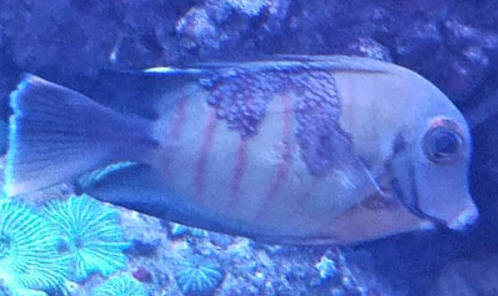 |
|
Re: Mimic Tang issue 11/21/17
Thanks for the reply Bob.
Only stinging organisms in the tank according to my friend are a torch
coral and a mini maxi anemone.
<Ahh; these might well "be it">
She is going to work on better diet and
vitamin supplement.
Hope you have a great thanksgiving,
Ron
<Thank you Ron; and you and yours. BobF>
|
|
Cloudy pop eye tang 7/8/17
Hi, thanks as always for the wonderful service you provide everyone! Your
advice, articles, and information are all super!
<Ah, good>
I have an orange shoulder tang I just got and apparently the sellers other fish
picked on it and damaged its eye.
<This beautiful species is on the end of the scale w/ a few others (Powder Blue,
Brown...) in terms of being hard to keep in captivity. REALLY needs a BUNCH of
room (hundreds of gallons)... VERY clean water...>
I attached a picture of the eye. It is in a 100 gallon stock tub QT now.
Should I treat the fish with something or just rely on good water quality and
food to help it get better?
<A tough question... as the bulging eye is unilateral/one side; this is highly
likely a case of trauma (rather than bacteria, parasitic...) issue>
If I should treat it what should I use? Does it look like it will be okay
eventually? Thank you!
<Let's have you read here re:
http://www.wetwebmedia.com/Popeyecures.htm
and the linked files above as much as you'd like; to gain perspective.
Unfortunately the prognosis for this species, kind of injury is poor. Bob
Fenner>
|
 |
|
Re: Cloudy pop eye tang 7/8/17
Hi Bob, thanks for the incredibly timely response. I read the FAQ's before
emailing, but didn't see a definitive answer, but after evaluating it more I
think what I'll do it wait and see.
<Ahh, yes. This is what I would do. This IS a fave species of Tang, esp. when
out diving in Hawaii, am always looking for its broad flanks scooting about the
bottom, feeding>
The fish came from someone's established tank and went to another reef keeper
whose fish picked on it, and then I got it so it is not brand new to a tank.
This evening I think the orange shoulder tang is looking a bit better. He is
eating Spectrum pellet food like a pig and picking on nori.
<Good food choices>
His eye looks close to the same. I'll just keep him in the 100 gallon QT tub for
a while and keep the water clean, it has a decent skimmer too. After that if he
is okay in 3-4 weeks he can go in my 300 gallon tank which has 500 gallons of
total volume going through it. Hopefully that'll be big enough. By the way, you
spoke at our reef meeting in San Diego and I saw you speak at the last MACNA on
butterfly fish, which I was contemplating getting but decided not to after
learning more about them. ��
<Ahh! Am hoping that Mark Lawson will help resurrect the San Diego Club. Have
offered to help in what ways I can/may... Giving programs, lining up others,
manufacturers, distributors for donations et al. Hope to see you at the upcoming
(August) MACNA in LA. Bob Fenner>
|
|
Sick Scopas 7/8/15
<Eight megs of pix? Why?>
I am after some advice about my tang. Other than the signs in the photo he is
eating, swimming normally and holding his fins out.
<Ah, good>
He is in a quarantine tank and the water quality is good. Please help me
understand what may be wrong. I really appreciate your time.
Thank you
Marc
<Search on WWM re Tang Trauma... READ the FAQs files there. This fish
has been stung, burnt, physically traumatized. Bob Fenner>
|
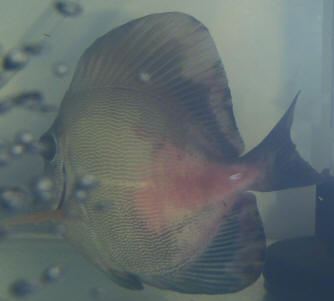 |
|
RE: Sick Scopas 7/9/15
Firstly let me apologise about the size of the photos. I had actually cropped
them and then downsized them but unfortunately in my haste to get the email off
to you I selected the wrong images (the original ones).
<Heeee!>
I will be more careful in the future. I had looked at the FAQ’s regarding tang
trauma but as the fish has only shown the signs whilst in the quarantine tank
I didn’t think that trauma was as likely.
<.... what other fishes, invertebrates present here? Any other animals with
marks? What re water quality tests? Where are the data?>
The patches of red are also visible on both sides. The tank is bare with no
rocks and only the pvc for the overflow (which can be seen in one of my
pictures). I had thought that maybe the redness and fin transparency were signs
of potential bacterial infection.
<Are other animals so effected?>
I will undertake a series of larger water changes
<Ahh; always a good idea>
and then see how the tang goes. I was considering treating with Kanamycin or
something similar if the symptoms persisted.
<No>
Thank you again for your time.
Marc
<Welcome. BobF>
RE: Sick Scopas 7/9/15
The scopas is in quarantine with a powder blue tang. They have not shown
any aggression towards each other.
<That you've observed>
There are no other fish. The blue tang shows no signs of fin damage or redness.
<The winner perhaps>
He probably doesn’t quite have the colour I would expect but considering he is
in QT it isn’t the most natural place and the lighting is very low. The only
thing with the powder blue tang is every so often he seems to bump into
something like the glass or the pvc overflow pipe (blindness??).
<Maybe; perhaps not.... could just be that A. leucosternon lives in large
spaces>
He isn’t eating as much as I would expect but he is picking at Nori that I put
into the tank. Both fish are just at the back end of hyposalinity
process.
<For? See WWM re; rarely provides permanent cure for anything... and this alone
might be an important contributor to the loss of scales in the Scopas>
It has been run at 1.009 with the pH kept at 8.0 - 8.1. The free ammonia is 0
and the nitrates are running at around 10 - 20 parts.
<Good>
The fish are due to come out of their hypo this week (4 week period). I had
planned to begin lifting salinity slowly over the next week. I have proactively
treated many fish with hypo and have never seen any adverse effects including on
numerous yellow tangs. I am somewhat stressed as I have not lost any fish to
disease now for some years (hopefully due to my process of QT, good water
quality and good nutrition). I have always found the tangs I keep to be very
hardy. I am hoping that will be the case with this fish.
<Me too>
The powder blue tang has been in captivity for approximately 5 years and the
scopas approximately 3 years.
<I would hasten them through the hyposalinity trtmt... Start raising the spg
now>
Thank you for your continued interest in my situation. I will hold off on
treatment with medication. All water changes were to use salinity and ph.
matched water.
Marc
<Thank you for this further info./input. B>
|
|
Sailfin tang... 8 megs.... NNS
4/18/15
Hi I jabe a quick question my tang came with this tank so he's old but I have
noticed this black spot at his mouth area that I can't seen to remeber him ever
having. It's a single spot no other fish have a spot similar to it. I have
include a picture to help. Trying to figure out if he needs any thing
medically speaking or if I should be worried about him or the other fish in my
tank.
<Nothing medically to apply here. Likely this melanistic area is due to a
long-since trauma.
Bob Fenner>
|
 |
Blindness in freckle tang
4/1/14
Hi everyone,
<Marc>
Hope all is well. I have found myself in a somewhat stressful position
and looking for some advice on the best way forward. I have a freckle
tang that I have had in QT for the past 4 weeks
<Mmm, well; this, a fave Acanthurus sp., decidedly does not like (gets
easily stressed by) small space confinement>
and he has been eating and looking great (I love these fish). However a
week ago he displayed the signs of significant swim bladder issues and I
treated with antibiotics (I was concerned it may be biological and he
didn't look happy - I understand it may have also just been a gut
blockage)
and I am pleased to say he is now swimming upright. The problem is and I
blame myself for not picking it up early enough during his issues with
his swim bladder he scraped his eyes quite badly and I fear he may have
physically blinded himself by damaging the surface of his eyes. He does
not appear to be able to see right now and I was wondering do I continue
to persist with him and see if he improves or is it more humane to
euthanize.
<I'd hold off on the latter for now>
It has been a week since he began swimming properly and I have made sure
water qualities are spot on and stable.
Thanks from a disappointed fish lover.
Marc
<Acanthuroids have remarkable powers of regeneration. Bob Fenner>
|
Atlantic Blue Tang ran into a Long Spine Sea
Urchin 5/30/2010
Hi,
I have a feisty Atlantic Blue Tang in my 400 gallon that ran into
a large black long spine sea urchin. I could see the broken off
spine protruding slightly from the Atlantic Blue Tang's head,
and it has a chalk white circular ring around it about a
1/4" in diameter (please see attached pictures). First of
all, should I remove the Atlantic Blue tang and try to remove it,
or just let it heal on it's own?
<This latter. Leave this fish in place; the damage will heal
of its own accord in time>
Secondly, what's the best way to get the long spine out of
the tank without tearing down the tank?
<A grasping tool of length at night time, when it is out
scouring the rock, bottom>
He is very fast and has grown very large.
Your help would be greatly appreciated.
Thanks,
Nancy B.
<Welcome. Bob Fenner>
|
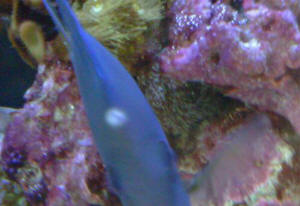 |
Re: Bio-load and wrasse compatibility. Sohal/Tang caudal
spine 1/21/10
injury
Hi Bob,
<Adam>
Sorry for the frequent e-mails, I figured I would keep this in the same
message stream so you know what set up I'm e-mailing about. Last
night I noticed that one of the defensive spines in front of my sohal
tang's tail was 'stuck' in a partially extended
position.
<Does sometimes happen with the Tangs that have mobile spines... not
a worry... Generally corrects itself in time>
I wasn't home for most of the day, but when I fed him earlier in
the evening he looked totally normal. In fact over the week he's
finally gotten use to people being in the room with him and has stopped
freaking out when I come close to the tank. He even begins eating off
the algae sheets before I've finished suctioning the clip to the
inside of the glass (he use to hide as soon as my hand entered the
water).
<Good>
I wasn't even sure what I was looking at first as I've never
actually seen one of those spines extended. He is still behaving
normally, but at this point I'm really worried that he's
somehow injured himself and with the spine extended like that it will
get caught on a rock as he swims around the tank. I also can't find
anything about this particular condition/injury online so I don't
know if it's normal (though I suspect not), if it can heal or if I
need to intervene somehow. The water parameters are all the same as the
first time I messaged you and the only thing I have added since we last
talked are three SPS frags.
Thanks again,
Adam
<Not really a worry. Bob Fenner>
Black Spot on Atlantic Blue
Tang 4/25/08 I want to first off say
thank you for all the help you and your website have given me. I
recently lost my UV light for about a week and was waiting for the
replacement to arrive. During that week I was out of town and when
I got home I noticed a few things. One was this large black spot on
my Atlantic blue tang about the size of a small pea. I attached a
picture I hope you can see the spot. <I do> I looked up Black
ick but I do not think that is it. Do you have any suggestions of
what it maybe? <Looks very much like a "recovery area"
from a physical trauma...> Another thing I noticed was since my
UV had gone out I now have this dark green almost black film on all
my flex hose and my skimmer is working overtime. Any ideas of this
blackish green film? <Microbes of various sorts likely... will
go with the lamp replacement> It is not on anything but the
hoses and plumbing nothing in the tank. Thanks Again Brad
<Not to worry here... Bob Fenner> |
|
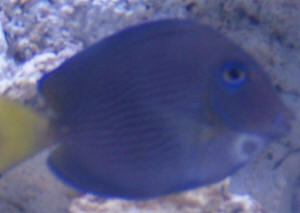
|
| Powder Blue with a white blob on fin
11/26/07 Hi there really appreciate all you guys do
<Welcome> Wondered if you could help me identify what if
wrong with my powder blue? <I think so> The blob is on his
fin near the base, looks like a small spider egg sack about 2mm in
diameter just wondered if you knew of a treatment or what it was
because it looks like its starting to bother him and affect his
swimming other than that he is eating just fine. Keep up the good
work Many thanks Luke, Hertfordshire, UK <This apparently is a
not-uncommon "reaction spot" from a tweaking of the soft
fin support and membrane in this area... Nothing to do other than
general good care. Will resolve on its own in a few days to weeks.
Bob Fenner> Ps levels are all fine tank is 150g all my other
fish are totally unaffected. |
|
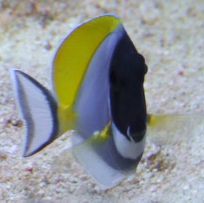
|
Re: Tang Scale
Damage 9/25/07 Hey, <Hello> Sorry to bother again, but I
think I may have figured out why the tang has those raised bumps on it.
Today when I checked the tang, it had quite a few on it, and I was
starting to think it might be Ich, but after looking a quite a few
pictures of what Ich looks like, I figured it wasn't that (the
bumps are not bright white, not small, or numerous, and are not
spreading to any other fish, which would have happened by now since the
tang has been having this trouble for a few weeks now). <Agreed>
Would bristle worms happen to be stinging the tang at night when its
sleeping? That is the only conclusion I can draw here, I have seen a
few of the little worms in the tank, and I figured since the tang
sleeps in the live rock at night that they could be responsible for the
injuries she is sustaining. Let me know if you think this is a viable
conclusion, Thanks, Dan <Possible, although it seems fairly
unlikely. Any chance you could snap a few pictures of the bumps and
send them along?> <Chris>
|
Purple tang barb -- 09/14/07 Hello, <Doug> First of
all - great site! I've been getting into marine fish for
about 8 months now and have found your site to be a tremendous
resource. Here is a problem I haven't found the answer to in
your FAQ's (although if it's there please do point me in
the right direction). <Would do...> First my system specs:
120 Gallons 80lbs of live rock 80lbs of live sand EV-120 protein
skimmer (with Mag 5 pump) makes about 3 cm of skimmate a day.
FX-5 canister filter NH4: 0 NO2: 0 NO3: 8 Do weekly 10% water
changes Did a 20% water change today just to make sure everything
is in tip-top shape. Fish: 2 Ocellaris clown (not originally an
official pair but now are essentially a pair) - each about 1.5
inches 2 maroon clowns (mated pair) - each about 2 inches
<Keep your eyes on... one, the female will become the alpha
fish here> 1 purple tang - about 4 inches long 1 very small
juv imperator angel (about 1 inch) <Wow! Will need more
room> 2 cleaner shrimp an assortment of snails and crabs as a
cleanup crew I have plans to upgrade to a 300 gallon once the
fish outgrow the 120. <Oh, good> Three days ago I added a
semilarvatus butterfly. <Mmmm... need more room again>
Initially the purple tang acted very territorial and went after
the butterfly anytime they came near each other. She would try
and hit her with her tail spike (the "switch-blade").
The purple tang made contact as far as I can tell just one time
leaving the butterfly with a small scratch that has healed
remarkably well in the last three days. However, during this
strike the purple tang appears to have injured her
"switch-blade". Since then it has been sticking out
perpendicular to the direction it usually lies and almost has the
appearance as if it was pealed outward. <I see this... does
happen> The purple tangs behavior has been otherwise
completely normal. She has calmed down and is acting very
peacefully toward the butterfly. She swims around the tank like
usual, eats with her usual veracious appetite and does not appear
to be in any distress. However, in the last three days her barb
does not seem to be getting better. One time I thought she was
not using her tail fin in the direction of the barb as much as
the other direction (but, I'm probably over-reading this and
she does use it some in both directions). Will this injury heel
on it's own or should I do something to help the fish?
<Will likely heal on its own> Thanks so much for your help
and for your wonderful site. Doug Ps- I've attached some
pictures of the purple tang and the infamous barb. DSC01283 and
DSC01284 appear to show it the best. Note: the white spots
you'll see on the tang are bubbles. I shot these pictures
right after a water change and a few of the bubbles created
attached to the tang. They are now gone. <Okay... Often,
collected tangs of many species have their "spikes" cut
back (along with their first few dorsal and sometimes anal fin
spines...) with a large "nail clipper" to prevent
damage to the catch and handler, bags... and these almost always
grow back w/o incident... However, completely torn or too-damaged
"tangs" do not regenerate... Which I believe is the
case here... But the specimen can live a good long life w/o this
defensive device. Bob Fenner>
Re: Purple tang barb 9/16/07 Thanks much.
It looks like it's healing. <Ah good. BobF>
|
|
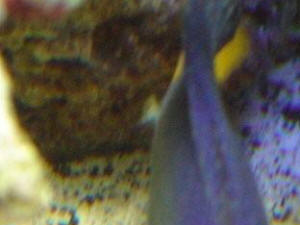 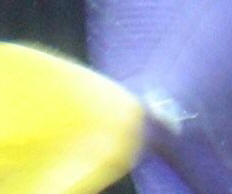
|
| Convict tang mouth disease 8/7/07 Hey folks -
<Chris> I've read on your site that a surgeonfish with a
mouth infection/disease is pretty typically a goner. <Yes> I
received a shipment of fish four days ago and put them in QT. These
fish are slated to be the inhabitants of my newly upgraded 150
gallon tank, <Not this one...> which has been running for a
couple of months now. Seeing as the tank has no new live rock or
other substrate (all of it coming from my previous tank), high flow
(~50x), and a EuroReef CS250 skimmer, I'm quite confident in
it's ability to handle the fish load, which include a blonde
Naso, pair of blue throat triggers, and Kole tang, all of which are
currently under 3 inches in size and share the QT with this convict
tang. The QT consists of a 20L, which I used tank water to setup,
currently has a nitrate level of ~5ppm, a SG of 1.024, temp between
78-80 degrees, a simply light, some LR and PVC. Because these fish
were bought sight unseen on the internet, I was taking a risk of
getting diseased/damaged fish. While I will likely get a credit for
the value of the convict tang, I'm more concerned now with the
health of the other fish in the QT. <I understand, and agree>
They all seem fat and happy (assuming they have no emotion of the
dying fish in their quarters), continue to eat and swim around, and
appear to be in good health. Are there any recommendations
regarding the care of the other fish? And do you know exactly what
this injury/disease is based on the picture? - Chris <Likely
this Manini was beat in collection, handling (with nets) and/or
repeatedly bumped into whatever container it was kept in (need to
not be placed in too-small "cubicles"... It's problem
is not contagious per se. Good water quality ought to do it here.
Bob Fenner> |
|
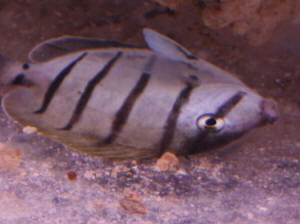 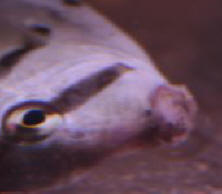
|
Hello WWM crew, I
have a few fish questions for you... Tang health f'
1/16/07 <Steve> Good morning, I have a few fish questions for
you. I have a bi-color angel that appears to have gotten
blunt force trauma to one eye. His scales near his gills on
the same side look as though they are a bit bruised. I
removed him this morning to QT and added 1Tbsp of Epsom
salt. (it is a 5gal tank). Though, I have
monitored him the past 2 days with this eye problem and this morning it
seemed to better. He also showed signs of Ick on a few parts
of his body. I am planning on keeping him in QT for a few
days until he clears ick and pop eye. I also plan on dipping
him to rid the ick problem. <?... see WWM re...> Main
tank parameters are 1.022 SG, PH 8.2, Ammonia 0, Nitrite 0, Nitrate 0,
temp 75F, 125 gal sea clear system two, <I really don't like
their integral filtration, circulation...> with external UV
light with about 100lbs LR. all fish even this
one appear to be eating well. Do you think I should add meds
to the QT tank to help with the eye problem, if so should it be for pop
eye and or antibiotics? <Perhaps an anti-microbial... A Furan
compound...> My next problem, I have two yellow tangs
with problems. One has black spots appearing on his
body. Do you agree that a fresh water dip will rid him of
this? <See WWM re Paravortex...> Is it contagious to other tangs?
<Yes, and a few other families of fishes... again, see...>
There is another tang that looks as though he has
"buck teeth." His upper lip look as though they
are kinda raised and his top teeth are showing. He has no
trouble eating. Have you heard of this? <Yes> Do you
think it will heal it self? <Depends on the cause, extent of
recession... look to water quality and nutritional issues here> I
could not find any thing on your web site that indicates these
issues. Thank you in advance. much appreciated. Steve
<See the many Tang Disease FAQs files... Bob Fenner>
Sailfin Tang
blindness? 1/15/07 Perhaps you can help me to
understand how almost overnight my 5 year old Sailfin Tang's
eye turned completely white. <Mmm, a physical trauma... swam into
something or vice versa...> The other eye is
fine. He is eating algae off the clip but I fear he
can no longer see the other food in the tank as it floats
right by him. I saw on another post you
suggested Melafix - <Not I...> is this the right
medicine for our Tang as well? <I would use nothing...
perhaps soaking foods in a supplement (vitamins, HUFAs...) will help to
identify the food, bolster the animals repair systems> The only
thing we did was a water change before this happened, but
nothing was different than what we usually do. I appreciate
any help :( <Will likely self-repair in time... Handling
the animal, dumping in "teas" or other "remedies"
not likely efficacious. Bob Fenner>
Kole Tang Run in with Tunze'¦. once an
accident, twice a mistake, but more get a clue? 7/25/06
Hi there: <Hello> My Kole Tang has been a super tough guy since I
got him in December or so. Always big and fat and eating. But on day 2
for reasons unknown I had to free him from the overflow
intake. Hmmm... Then in January, he twice was stuck to the
intake of a Tunze 6060 rotating on Sea-Swirls.<Poor guy> That was
odd indeed. Second time he was on it for a while, seriously
tattooed on one side. <Hmmm I probably would have done something
creative to keep the fish from the intake and overflow the first time
there was a problem. Perhaps the pumps are to strong or the fish weak
for some unknown reason.> Recovered from that though too. <Lucky
fish>I target fed to make sure he ate well and frequently, at least
3x a day. Starting maybe in March, I'd say every couple weeks
I'd arrive home to see that the scales were missing in a splotch on
one side, almost always on his left side. In fact, I think
always'¦.that is the side he was stuck on that last time on
the Tunze. <I wish you were kidding but I have a feeling you're
not. Seriously you need to do something to keep that poor fish off the
intake of that pump. 4 months every 2 weeks'¦. so the poor
fish has been injured at least 8 times in the last 4 months, not
including his original 3 injuries. How many times does it have to
happen before you do something about it?> Anyway, I'd always
target feed and he'd always eat and it would always clear up within
a couple of days. <Very resilient. It's great that you are
taking such good care of him after he is injured but some prevention
would go much further. One of these days the poor fish will not be so
lucky.> I'm thinking, tough guy. <Perhaps initially but every
time he gets hurt he is probably getting weaker, with a good chance of
some permanent damage to that left side.> Now I am not so sure.
Tonight he is deep within the rockwork, not breathing hard, but
hiding. I can see that the scales are missing between his
eyes right on his head, and a bit on the side of his mouth. Hard to
tell much else as it's dark in there, even when the lights are
blasting away! Not a chance of getting a picture. Most
worrisome is he didn't come out when he saw me or when I fed the
tank and that is an absolute first. <Indeed, not a good sign.>
That has me concerned in the morning he'll be gone. <As you
should be, there is a good chance he could be. I would try turning the
lights off and doing a water change.> When I say the scales are
missing is I see white flesh. I figured wounds somehow against the
rocks or maybe he picked a bad fight, though with whom given my stock I
haven't a clue. He should be the boss. <Hard to say
given you have not listed the tankmates. Less dominant fish will often
pick on injured or weakened fish.> Anyway, white flesh is apparent
now on his head similar to in the past when always on his body.
<Perhaps this was his last run in with the power head intake. If not
and he survives you need to do something with that Tunze intake> Any
ideas what this could be or what I could do??? <Sounds to me like he
had yet another run in with the Tunze. If you can gently get him out of
the tank, you could try putting him in another tank to
recover'¦.. a hospital tank where he is safe from the Tunze
and other fish. Set it up similarly to a quarantine tank with hiding
places. Keep the lights off and water quality good. If he survives
PLEASE do the poor fish a favor and do something with that pump intake.
Build a mesh basket around it or place a sponge over it. We do this all
the time in seahorse tanks. It's really not a big deal. It may not
be esthetically pleasing and the sponge will need to be removed
frequently to be cleaned, but at least the fish will be protected from
further trauma. This may sound harsh, but needs to be said'¦
once an accident, twice a mistake but really 3 and on up times is
irresponsible to say the least. You really should have done something a
long time ago. It is your responsibility to protect the creatures in
your care from harm as best you
can. Leslie.>
Re: Kole Tang Run in with Tunze'¦.once an
accident, twice a mistake, but more get a clue? (continued) 7/25/06
No, you have totally misunderstood. I don't know how you
misread that but sorry for my part. <I apologize for the
misunderstanding> Anyway, the Tunzes are out. I now have
modified MaxiJet 1200s on the swirls, he's never had a problem with
them. <That's good to hear> These wounds are not the wounds
he had when stuck in the pump, and began to appear months after those
incidents, which have not recurred. This is not a pump issue. Something
else is going on. I have a pic now at www.ostrows.us/sickkoletang.jpg
I'm wondering if there is some parasite or bacterial disease that
could do this? <It's possible but hard to say for sure. Those
are good-sized white patches/wounds. It is really hard to tell from the
photo if they are actually wounds with broken skin or white patches. In
my experience white patches of bacterial and parasitic etiology are not
usually that size when first noticed. There is usually some indication
something is going on earlier, before the patches get to that size.>
Tankmates: 2 green chromis, 1 royal Gramma, 1 percula, 1 hepatus, 1
scribbled rabbit, 1 mandarin goby, 1 Flamehawk. He's the biggest
except for the Rabbitfish. <I am going to guess that perhaps he
injured himself on the rock or was injured by the venomous spiny rays
of the Rabbitfish. If he seems to be holding his own in your display
tank and none of the other fish are bothering him I would leave him
where he is and keep a close eye. In addition I would recommend a water
change, maintaining stable and pristine water quality as well as the
addition of a vitamin like Vita Chem to a healthy varied diet. I would
also add some Bets Glucan to his food. You can get this at most health
food stores. Beta-glucan is a potent immunostimulant that provides
important health benefits for fishes. Research indicates that it helps
prevent infections and helps wounds heal more quickly; it is safe to
use in conjunction with other treatments and has been proven to
increase the effectiveness of antibiotics; is known to alleviate the
effects of stress; and to help fish recover from exposure to toxins in
the water (Bartelme, 2001) . For more information on Beta Glucan for
aquarium fish, please see the following article: http://www.advancedaquarist.com/issues/sept2003/feature.htm
If he does not appear to be doing well in your display tank and the
other fish are harassing him. I would remove him to a hospital tank and
follow the above directions. If the wounds appear to be getting worse
you may want to consider the addition of medication. I hope this helps,
Leslie>
Kole Tang Run in with Tunze, once an accident, twice a
mistake, but more get a clue? (continued 7-31-06) I'm using
Selcon regularly. <That's great! Vita Chem has additional
nutrients. It might be nice to rotate the 2 supplements. Rotating
supplements is another way of varying the diet so your fish get a
variety of nutrients.> I have Beta Glucan around (are you Puffer
Queen in another world?) which I have used in an anti-Ich food recipe
that works wonders for me. <Nope, not the Puffer Queen in any world,
more like the Seahorse Queen in this world. I do have Puffers though
(not in the same system as my seahorses> Maybe I'll try that.
<That should be fine as long as there are no medications in your
anti-Ich food recipe. Take care, Leslie>
Re: Kole Tang Run in with Tunze, once an accident,
twice a mistake, but more get a clue? (continued 7-31-06)
Thanks.<Your welcome> There are medications in the Ich recipe.
I'd just use Beta Glucan for this, though an antibiotic is going to
be tempting if it happens again, given the seeming risk of infection
with that size wound. Hopefully your Ich recipe does not contain any
antibiotics, since Ich is a parasite and antibiotics will have
absolutely no effect on it. The problem with the indiscriminate or
inappropriate use and inadequate dosing of antibiotics and other
medications is that this causes the organisms to build up resistance
creating super strains of organisms. These resistant organisms do not
respond to the traditional medications in the traditional doses thus
making treatment difficult and limiting treatment options. I am sure
you have heard the expression "An ounce of prevention is worth a
pound of cure." There is a great couple of article about disease
prevention in the marine aquarium please do have a look at this
here.... http://www.wetwebmedia.com/mardisease.htm Take
care and best of luck with your Tang, Leslie>
Red streak in tangs faces from bald rocks (lack of turf
algae) Anthony, can you come back on this. <right back atcha>
What you're saying is new to me. <the phenom in
understated in the hobby because most aquarists have nutrient problems
(lack of water changes, good skimming, etc) and in turn have an ample
supply of turf/microalgae growing in the tank. Tangs naturally forage
all day long regardless of how well you feed them in quick shots thru
the day. So... if your tank is the exception with very little algae
growth, it may very well explain your tangs streaks in an otherwise
healthy fish.> I have a neon velvet damsel, three yellow ail damsels
and a saddle puffer in the 75g. Obviously, these are
aggressive fish. But, what do I do? Suggestions?
<sure... a refugium inline that grows Chaetomorpha or Gracilaria
algae. Harvest the algae daily/weekly and drop in to the main display
to feed the tang... nutrient cycling> I feed once a day with dried
algae and occasionally romaine. The tang also feeds on the
frozen cubes and flakes (tough I'm sure that's not his
reference). Should I try some new food? Should I
remove the fish from this environment? <the problem
is matter of grazing opportunities (or a lack of) not the
quality of food. If you cannot rotate algae covered rocks from a
refugium or another tank... you may need to feed more Nori seaweed or
indeed remove the fish> Would love to hear more. Thanks, Steve HJ
<best regards, Anthony>
Red streak in tangs faces Thanks. Do you have a
specific URL (internet address) on the website for red
streak? If not, I'll just go sifting. I
thought this was mainly a water quality problem, but apparently
not. I've done several 10% water changes the last two
weeks and nothing seems to help the Tang (and that was after a 30%
change). Thanks again, Steve <Anthony Calfo at bat here with input,
Steve... Red Streak in tangs is also caused by simple and literal blunt
trauma from tangs kept in very aggressively (well) maintained tanks
where there is little or no soft microalgae to graze. Even with three
feedings daily, that still leaves many hours to forage unnaturally and
repetitively on bare glass and rocks. Blunt trauma. Anthony>
Torn caudal spine, tang 7/3/06 I have
a 250 gallon reef tank and I recently noticed that my sohal tang has a
torn caudal spine. Not sure what it could have been from but
am concerned about it. What do you
recommend? Thanks Brett <Mmm, actually
"nothing"... such tears/damage are not uncommon, and can,
often do heal of themselves. Handling tangs is dangerous business...
most all collectors have been sliced, gashed as times (I have on
several occasions)... It's not worth the possibility of damage to
yourself or the fish... The usual recommendation here to do what you
can to provide good environmental conditions, nutrition otherwise. Very
likely there will be no repercussions to the health of this fish from
this damage. Bob Fenner>
HELP!! Tang with urchin wound! Dear WWM Crew <Rebecca>
MY idiot yellow tang swam into my long spine urchin (diadema sp.
)!!What should I do? It is sticking out of him still, but since you can
kinda see through him, it doesn't appear to be puncturing any
organs, but I am not sure where the swim bladder may be. <About
straight back from the pectoral fin/s... at their end on the body if
you folded them flat> Around the wound and up a little bit, is kinda
whitish, or bluish, is that the poison? <Mmm, no... color from the
spine> Should I pull it out or leave it in to work it's way out?
<If it's small in size, leave it...> I know that urchin
spines are made to go only one way-farther in, so would pulling it out
hurt him more? <Mmm, not on fishes> Should I Quarantine him with
Mela-fix? Oh, what in the world should I do? <Patience... take
several deep breaths... this too will work itself out> BTW, the
stupid fish is just swimming around like normal and eating the seaweed
I just put in as aggressively as ever. <Good> Thank you for any
help, and hurry with answers please! Thanks, Rebecca <Welcome.
Bob Fenner, whose been poked by both tangs and urchins plenty of
times... and is still around>
Bruised Tang? Hello. <Hey!
Scott F. here today!> I just noticed my Desjardini Sailfin Tang has
this HUGE black (for lack of a better way to describe it)
"splotch" on the lower part of its body. It is about the size
on a thumbprint and it is only on one side. I have attached a few
photos. <Hmm. didn't see the attachment> Under close
examination, I noticed some light "scrape marks" on top of
this area. Is this a bruise or could it have gotten into it with one of
my other tangs (Blue, Powder Blue, Naso- all are roughly 4")? All
of these fish have been in the tank for a while now with no
prob.s, but the Blue and the Naso are growing fast! Or
perhaps the fish bumped itself on the live rock or dead coral in my
tank? <A distinct possibility. I have seen such a
phenomenon before with this very species, and the fish recovered
without incident.> The fish is still eating like the pig that it is-
pellets, Formulas 1&2 (both flake & frozen); frozen Mysis,
Spirulina, etc... <Excellent...A fish that eats is a fish
that lives!> Water tests fine: 8.2-8.4 ph; 0 Ammonia; 0
Nitrites; 60 Nitrates. Temp is 78-79. Salinity is about
1.020. 125 gallon tank w/ prefilter, wet/dry, and protein skimmer Do
fish bruise? Do I need to remove this fish from the tank? Appreciate
you getting back to me ASAP! Thanks! Michael <Well, Michael, it
certainly seems possible here. I'd simply observe the fish
carefully, feed it as much as it will eat, and maintain excellent water
quality. I'll be the fish makes a full recovery in a relatively
short time. Good luck! Regards, Scott F.>
Bruised Tang? (Pt. 2) Hi Scott! <Hello again!> Thanks
for getting back to me. Turns out the very next morning (about 8
hrs later) the "splotch" was about 80% gone, and
by this evening 95% gone! <Excellent! Glad to hear!>
Basically no black left, just the faint scratches. I'll
try sending the pictures again, if for no other reason than for a
reference to help others. Once you see the pictures, perhaps you can
tell me what this was? <I'll certainly try! Thanks for
sharing!> Thanks again! Michael <My pleasure, Michael! Glad the
fish is on the mend! Regards, Scott F.>
Kole On The Decline? I just purchased a Kole Tang one week
ago, and everything was fine except that she wouldn't eat the sea
weed either from the veggie clip or when floating around the tank. The
Kole Tang was eating Spirulina flakes with vigor just a few days ago.
Yesterday, I noticed that she had some light blotches on her forehead
and stayed completely hidden (under a large rock) and didn't come
out for food at all. <Hmm, not a great sign, huh?> Her mouth was
open and looked fine although I'm not sure if it was swollen. <
Do confirm this with careful observation. Sometimes, Ctenochaetus tangs
do occasionally suffer from "collection traumas" and other
injuries to their mouths, and these visible problems should disqualify
a specimen from selection for your tank. When the mouthparts of these
fishes are damaged, they rarely recover. Not trying to paint a
"gloom and doom" scenario here, but, based on your
description, there is a possibility that the fish may be damaged in
this manner..> This morning, I used a flashlight to examine her in
her little cavern and it looked like maybe the white blotches might be
HLLE. Since I have not seen any pictures of this on the internet I
cannot diagnose properly. <Well, HLLE symptoms usually include a
"pitted" appearance to the head of the fish. White blotches
sound more like a fungus or a bacterial malady of some sort. It sounds
to me like this fish needs to be moved to a "hospital tank"
for observation and/or treatment. Do read up on the wetwebmedia.com
FAQs on disease to confirm what it is you may be dealing with. With
quick, decisive intervention, you may be able to save this fish
(assuming that the mouth is not damaged, as discussed above).> Is it
time to heat up the frying pan or can I still save my Kole? Tank specs.
Tank:100GAL Sump: 40GAL (approx 17GAL full) PH: 8.3 Ammonia: 0 Nitrite:
0 Nitrate: 0 ALK: Normal Temp: 80.5 SG: 1.024 (using the
plastic Coralife Hydrometer with the arm) I do not have a grounding
probe and the other fish in my tank are a blue damsel and a three
stripe damsel. The tank is three months old and has approximately 30lbs
of live rock in it. Thanks, Peter <Well, Peter, it sounds like your
tank conditions are okay...I get the feeling that you're not
dealing with HLLE here for a number of reasons, not the least of which
is the very rapid onset of the symptoms. In the future, please
"play it safe" and quarantine all new arrivals for a minimum
of 3 weeks before releasing them into your main system. Tangs, in
particular, are notorious for contracting diseases during collection,
shipping, and acclimating, and quarantine gives you the opportunity to
observe, "harden", and treat the fishes if necessary without
incurring the added stress (for both you and the fish) of removing it
from the main tank, or spreading disease to your other fishes. Take
quick action with this fish...Good luck! Let us know if we can be of
further assistance. Regards, Scott F>
Kole On The Decline? (Pt. 2) Thanks for your response, I
examined the Kole Tang again most of the night and she seems really
slow and unresponsive. Not like when she was purchased. At this point
it looks like her mouth rarely closes if at all. She did come out to
eat, although not with the same vigor as last week. <The fact that
this fish is eating is a good sign!> Do you know of any successful
treatment if this is mouth trauma? <Well, if the mouth is damaged,
it's unlikely that a medication could help. However, if the fish is
"gaping" due to a bacterial infection, then a medication
could perhaps work. Impossible for me to diagnose here, so you'll
have to really take a look at this fish and review the disease FAQs on
the wetwebmedia.com to try to verify exactly what you're dealing
with. Try to verify if the mouth is actually "injured",
versus swollen.> Some type of antibiotic, or, medication to help her
through this? <Well, I'd go for a broad-spectrum antibiotic,
such as Maracyn 2. The administration of the medication should really
take place in a separate aquarium. At the very least, freshwater dips
may help if you're hesitant to try a medication. This is a more
manageable, but possibly less effective treatment, if a
"hospital" tank is not available.> At this
point I do not have a quarantine tank set up. But after this experience
I will in the future. Peter <Certainly a great idea! You'll
definitely reap the rewards of this practice down the line! Good luck!
regards, Scott F.>
White spots on tang...not Ich? I just recently purchased 2
4" blue palette tangs for my 125 gallon tank. The system is fully
matured at 3 years and no problems with disease/water quality....all
test kit readings are up to par. I have noticed on the side of the blue
palette what appears to be "white paint splatter". It's
not ick....trust me I know ick and all its forms. He doesn't seem
to be irritated or flashing. He has a great appetite and the spots are
lighter than they were 3 days ago. I have been using a concentrated mix
of Kalkwasser with a syringe to help rid my take of Aiptasia.
<Another suggestion for those pesky Aiptasia...consider sealing them
on the LR with a spot of two-part epoxy.> I usually do a treatment
and then do an immediate water change so the chemistry is not way off.
Is it possible this tang got "chemical burn" from the
concentrated Kalkwasser left behind on some rock??? <Anything is
possible, but I doubt it. If you are sure it's no Ich it may just
be fright colors> I'm not sure If I should move him to
a hospital tank just yet. <The first time these tangs act
the least bit lethargic or start flashing, they would be out of there!
I hope you quarantined these guys. Their nickname is "Ich
magnet." None of the other fish exhibit the symptoms. <Keep on
the lookout!> Any help would be appreciated <You're welcome!
David Dowless>
White spots on tang...not Ich? Thanks for your suggestions!!
Spots are starting to disappear when I checked this morning. Yes, I
always quarantine my fish before allowing them in the big tank. I
usually just do a dip though on tangs, because I know extended exposure
to chelated copper does something weird with their "gizzard"
hahaha....intestine tract. Thanks again, Brian Maslouski <Yes. Keep
the water quality optimized. Remember that Ich has a life cycle that
occurs both on and off the host. Even if the spots disappear it
doesn't guarantee the problem isn't Ich. keep your eye on this
guy...David Dowless>
Marks on Tang Mr. Fenner,
<<Actually, JasonC here in his stead...>> I am sorry to
bother you. <<No worries.>> I posted some
pictures on the Wet Web of my hippo and some red marks he has on his
side. I also posted a message on the chat forum regarding this, but I
was hoping to also get your very valuable opinion as well.
<<Fair enough...>> I woke up this morning and my hippo had
all these red marks on his side. They are NOT inflamed. They almost
look like bruises. I have seen him with open cuts (from parasite that
were removed during FW dip) and those open cuts looked orange. I am a
little afraid that he somehow hurt himself. Are bruises in fish red?
<<Sometimes.>> I think he may have gotten in a
tiff with a snail for hanging out in the hippos spot. I think he may
have tried to swat him with his tail and instead hit his side on the
rock. Does red marks sound consistent with this? <<Not
really very likely, these fish are quite skilled in their
aim.>> He ate fine this morning and is very active, he is a
actually a little mad at this snail right now. <<That's
a good thing, eating is always a good sign.>> My question, does
it look like bruising, a cut or parasites? <<Knowing a
little bit about your tank, my guess would be the occasional flicking
the Hippo receives from the Sailfin... the Sailfins can really be quite
aggressive, and certainly more so than a Hippo tang.>> I
know the picture is not that clear, but hopefully my description is
good enough. <<Found the photos.>> Also, should I
treat him, or let him take care of it? Fearing the worst, I gave him
some tetra antiparasitic and antibacterial flakes this morning to make
sure I could catch what ever it is right away. <<Well, the
Tetra foods will certainly help stave off an infection. But you should
really observe closely the interactions between your two tangs as this
is the most likely culprit, and if the aggression continues, you will
likely need to lose one of the two, or isolate one in order to bring
about resolution to the problem.>> Water Parameters are good.
AM=0, Nitrites=0, PH = 8.2, SPG = 1.022.5, Nitrates= 40 ( these are
usually a bit higher than 0 anyway)... Temp is about 80 Any advice
would help.... BTW my screen name is Freckleface. <<Yes, do look
very closely at the interactions in the tank. I know you're quite
attached to the Hippo tang so I wouldn't waste any time. If need
be, get rid of the Sailfin. Cheers, J -- >>
Re: Marks on Tang Jason, Thank You so
much. I honestly do think he hit the rock. <<Fair
enough.>> I say this because I was trying to move the snail
myself and while he was trying to flick the stick I was using he
smacked the rock so hard it hit the wall of the tank. Which, sadly
enough, I have seen him do on numerous occasions. Does this mean my
hippo is not too smart or just has bad aim? <<Well, most any
animal isn't going to continue behaviors that cause injury to
itself for too long unless it's a life or death situation... but I
suppose if we are going to consider a lack of smarts, then we'd
have to concede that this tang probably has a deficit of them.>>
If this were from the Sailfin, would the marks be scattered like they
are? <<Sure.>> They don't look like cuts, but I
have only seen a tang cut on my hubby's finger, so I am really not
a good judge at that. <<Well, without scales it's not
really a fair comparison. By nature the wounds should look
different.>> How long does it take for something like this to
heal and is there a way I can tell if these are bruises or if they are
open? <<Time to heal depends on many other circumstances,
overall health, etc. Only way to really tell how serious these wounds
are would be to remove the fish from the water and do an inspection, up
close and personal, perhaps with a magnifying glass. Not entirely
practical, but perhaps worth it if you are concerned.>> If
they are open, can he still fight it off on his own?
<<Again, "if" this is aggression, without removing the
source of the injury, then there's no real way to get ahead of it.
If the tang is indeed masochistic, well then... it's really hard to
say.>> I just went home and saw him at lunch, he looks the same
and is eating like a piggy, so good sign. <<Good
deal.>> And the snail moved! <<Perhaps this
will help ease the tension.>> Thank You again, as always, your
help is greatly appreciated!!!!! <<My pleasure. Cheers, J --
>>
Wilting Tang.... Bob, <<Actually,
JasonC this time...>> I have a post on WetWebMedia and have
gotten data but no solid answers to my problem. My Tang has major
damage. Please look at: http://mywebpages.comcast.net/hcs18/fish.html
<<OK.>> I thought it was diet, sounds like others may be
picking on him. <<I would say for certain this is the
problem, based on those pictures.>> If so I suspect coral banded
shrimp. <<Not my first pick, I would suspect the six-line
wrasse; these guys can be real jerks. The coral banded shrimp would
only take advantage of something that can't help itself. Reading
ahead, I should caution you that this tank is rather small for this
fish load... your tang needs more space, as does the fish that is
picking on him.>> Specifics: 55 Gal, Flame Angel, Tang, 6 line
wrasse, Hawkfish, royal grandma, Breeding clown pair, coral banded
shrimp, starfish, 3 fish that I am confused at. I thought they were sea
bases, anyway they are in first picture as well. They are green/blue in
color, that did not show well in picture. <<Those are
Chromis, part of the Damselfish family - you can read up on them here:
http://www.wetwebmedia.com/chromis.htm >> Thanks in advance Bob,
Dale <<Cheers, J -- >>
Re: Wilting Tang.... Jason Thanks for
such quick response. <<My pleasure.>> I have been
feeding some of the "freeze dried" seaweed. (last few days).
What would you recommend feeding him? <<More than one type
of dried seaweed, and perhaps some meaty foods too, Mysis, etc.>>
We read steamed broccoli and the like in books would help.
<<No, I'm not a fan of these.>> Bob seemed to say no to
that idea because of possible chemical agents. <<That is a
possibility, but realistically, Tangs don't eat broccoli in the
wild. It's best to try and duplicate their normal foods. You might
also consider some new live rock so the tang can pick at the
fauna.>> He seems to be looking worse faster now.
<<Can be the nature of being picked on.>> Should I put in
hospital tank? <<I would say yes,
definitely.>>
Injured Tang Mr. Fenner, I wanted to ask
about your thoughts about my tang who is recovering from a nasty gash.
I also wanted to say that it was completely my fault. When you said
that it was uncommon for such a thing to happen it made me think. I
told you about building up my LR for the new aquascaping some days ago.
I made sure that the rocks were secure. What I didn't do was make
sure the pump that runs to my HOB skimmer was not loosened when I was
working on the rock. :( <Arghh> I went back to the "seen of
the accident" to look over the area. The pump had slipped just
slightly down from the zip ties. What I am convinced happened was that
my tang forged between two rock, nipped at it, and cause the already
weak pump to come down on the rock. I think that was what caused her to
become trapped and for the gash. <Maybe. But will worrying change
the future?> My QT is running at optimal and I am keeping a frequent
close eye on it and my tang. She has been for most of the afternoon at
the top of the water and gasping at times. I tested the oxygen level
and it was fine so I have concluded that the tear to the gill is
causing her problems. What to do with that for right now I am not sure.
The gash it's self to my untrained eye does not look infected. I am
not sure what it would look like for that matter. I have search the web
hoping for a picture of an infected wound but found none. Do you know
of any web sites with a picture of anything close? <No my
friend> I just want to be able to take swift action if anything
comes up. I am more writing this e-mail to thank you for making me look
at my actions in the tank and why this happened. It was a sad but
needed lesson. Anna <All will work out as you will see. Bob
Fenner>
A trapped tang (at least injured) Mr.
Fenner, First off I want to thank you for the quick response to my
first email. That was such a welcome surprise. Just to recap, I wrote
to you asking about the PVC pipe maze in my aquarium. I finished that
two days ago and I am pleased with how natural my artificial cave work
looks. This morning I walked into my living room where the tank is set
up (lights still out) and glanced at the tank and could not find my
yellow tang. About ten minutes later the lights went on and I found
him/her trapped between two pieces of LR. <Very unusual that
fishes get jammed so> I pretty much freaked out, jammed my hand in
there and separated the rock to free him/her. A huge gash is on her
right side from the gill to just before the white spot of the tail. I
netted Peanut (silly name I know) and placed her in the quarantine
tank. I made sure to lower the SG to 1.019 and placed the suggested
amount of StressCoat to the water. I placed a clip of green algae
(favorite) in and it was eaten like there was nothing wrong. I am very
concerned about the gash and how it affects the gills. Peanut's
breathing is different. I wouldn't say labored but more spastic. I
don't want to let her suffer! Will time only tell or is there
anything more I can do for my friend? If you get a chance (no rush)
please drop me a line. Thank you in advance. <Hmm, well, that the
fish is eating is a good sign... There are a few topical things, dips,
adjuvants that one can apply... weighing the trauma, effects of these
actions against their benefits. For now I would do nothing... if the
wound appears to be infected in a few days, it may be worthwhile to
remove this fish and daub on an antiseptic... we can talk then. In the
meanwhile I would try to keep its environment optimized and stable. Bob
Fenner>
Red rimmed mouth on a Tang Hey Bob I have a Sailfin Tang with
a red rimmed bloody looking) mouth. He also is showing faded color
(Like night time colors). I assume the color is due to stress.
<Yes... not good all the way around> And assume the red mouth is
the cause. <Hmm, "per accidens" perhaps... that is
not the ultimate cause... that would be what resulted in the red mouth
condition...> I've looked up every disease reference I can (book
and online) and have not found a disease that seems to be what the
sailfin has. I know it could be from fighting or slamming into
rocks/tank sides. <This is the most likely possibility>
However with close observation I am not seeing any of these behaviors.
There is a 3 week new Asfur Angel in the tank (A 90gal FOWLR) and the
tang and the angel tussled on the first day. However they seemed to be
getting along fine after the first day. No obvious attacks. The other
inhabitants of the tank are smaller and less likely to be the culprit
(Tomato clown, algae blenny, Juv shy hamlet, small yellow tail
damsels). <Well... the reddening is due to either physical trauma
and/or bacterial or other microbial involvement... and
"curable" through good husbandry, time going by... hopefully
this specimen is still feeding...> My water tests out with no
measurable nitrates, nitrites, ammonia, etc. I do have a UV filter and
protein skimmer, as well as a canister filled with bio-filter media. I
water change 10gals every 2 weeks. No other fish has any sign of
disease and all, including the tang, are eating great. I feed a mix of
frozen angel food, a homemade frozen "Selcon soaked Primereef with
Nori", and a "veggie" frozen commercial fish food. I
have grape Caulerpa, hair algae and a small amount of feather Caulerpa
growing in the tank. <Sounds fine> So, my question is: what does
he possible have, and what do I do about it? Sorry, I wrote you a book!
I am going to get one of the fish conditioners that increase slime coat
and dose the tank to maybe prevent any secondary infections. Thanks
Rich <My take is about all summed up above... something triggered a
trauma and infection to the mouth of this fish... no dip/bath, addition
to the water, physical manipulation will aid it in recovery... do as
you relate here... keeping the environment optimized and stable and
hopefully this problem will resolve. Bob Fenner>
Surgeonfishes: Tangs for Marine Aquariums
Diversity, Selection & Care
New eBook on Amazon: Available here
New Print Book on Create Space: Available
here
by Robert (Bob) Fenner |
 |
|
|

